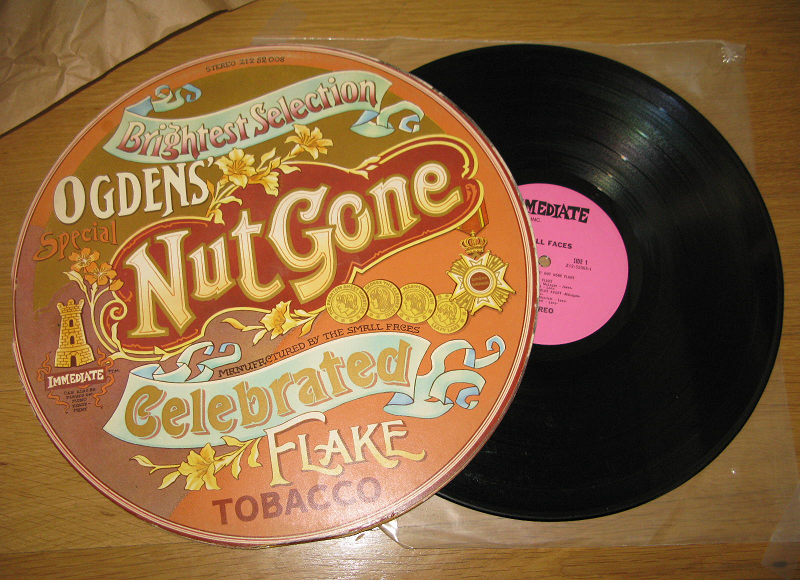 “God knows how it worked, but it did, and I’m very proud of it, and the other Small Faces are, too. It was worth the year’s work…It’s timeless to me.”
“God knows how it worked, but it did, and I’m very proud of it, and the other Small Faces are, too. It was worth the year’s work…It’s timeless to me.”
–Steve Marriott, Trouser Press, 1981
The Round One. That’s how the Small Faces’ 1968 LP, Ogdens’ Nut Gone Flake, is sometimes referred to—providing it’s referred to at all.
The Round One? But aren’t all records round? Actually, plenty of records are square, but that’s another story. Getting back to the disc at hand (or in hand if you’re lucky enough to have an original copy in your possession), just as The Beatles’ White Album was so nicknamed for its distinctive cover, such was the case with this LP.
Released on the now-defunct and then-eclectic hot-pink Immediate label, co-owned by ex-Stones boss Andrew “Loog” Oldham (with the accent on ham), Ogdens’ inner tunes came shipped in a circular cover designed to simulate, in 2-D, a tobacco (wink wink) tin.
Unfortunately, although the album and its offsprung singles were hits everywhere else on the globe—topping the charts in their native England—the shape of the cover generated more attention back in the US than the shape of the music.
“While lacking the awesome stature of a Sgt. Pepper or a Pet Sounds, Ogdens’ Nut Gone Flake is nevertheless a rock classic,” wrote Steve Clarke eight years after its release.
Another journalistic retrospectator, Richard Cromelin, opined, “Ogdens’ was the classic fulfillment of all the bands’s musical strains…Though packed to the brim with studio effects, minute overdubs and busy background din, its coherence and economy offset the tendency toward overproduction.”
Studded with no less than four musical jewels (“Afterglow,” “Rene,” “Song of a Baker,” “Lazy Sunday”), side one glistens with a refreshingly original blend of English music hall influences, psychedelia, R&B, rock & roll and pub sing-alongs.
“The Small Faces understood that power and fullness weren’t a product of sheer volume,” wrote Cromelin, “but of judicious arrangement and placement, as best exemplified in ‘Afterglow,’ which can attain monumental proportions and project an exciting ‘live’ atmosphere even when the volume knob is turned down low.”
Following the opening instrumental title track, replete with swirling phasing a la “Itchycoo Park”–Small Phasing—comes “Afterglow,” one of the ‘60s best singles. An unsilly love song, it is fueled by Marriott’s incomparable, impassioned vocal, alternately tender and frenetic, and beautifully colored by Ian McLagan’s soulful Hammond B-3 and insistent piano, Kenney Jones’ impressively dynamic skin-work and Ronnie Lane’s economical yet underrated bass lines (the bass by Lane stays mainly in the plain).
Ogdens’ unleashed a new aspect of The Small Faces’ melodus operandi: high-spirited humor. Side one’s nods to their jolly joie de vivre are the infectious “Rene (The Docker’s Delight)” and “Lazy Sunday,” the latter a jaunty tune sprinkled with the sounds of bells, whistles, birds, the ocean, a duo of paper-and-combers humming out a shaky Stones “Satisfaction” riff, and a comic Cockney vocal delivery by Marriott.
Wooden it be noyce to gat on wiv me nye-bas
They mike very clee-uh thy’ve gawt no room for rye-vas
Slotted midway between “Afterglow” and “Lazy Sunday” is “Rene,” a ribald classic spiced with lusty British humor, rich lyric imagery and English music-hallmarkings. The verses are a steal—they creep along Pink Panther-like, conjuring up salty visions of waterfront barflies on the prowl, while the choruses robustly sing out:
She’s Rene, the Docker’s Delight
And a ship’s in every night
Groping with a stoker from the coast of Kuala Lumpur
The elongated end of the song is somewhat reminiscent of the “Lovely Rita” climax on Sgt. Pepper. From a meter maid to a made meeter.
“Song of a Baker” is a mini-master-class in dynamics and pacing. Lane sings lead with Marriott high atop in harmony in the choruses. The killer guitar solo proves that Marriott was always an underrated axe-man, even when he was Facing the music in the ‘60s.
Flipping the disc, The Small Faces went from apex to zenith.
“Are you all sitty comftybode two-square on your body? Then I’ll begin. Now of course, like all real-life experienstory, this also begins once apolly tie-toe…”
So begins side two, a thematic musical first. Narrated by English double-talk artiste Stanley Unwin, the story of Happiness Stan was the first (and possibly only) rock fairy tale, predating S.F. Sorrow, Tommy or any of the so-called rock operas.
In a Trouser Press interview, Marriott recalled, “Me and Ronnie used to get very stoned and sit around the garden in the evenings, playing. We started talking about doing something about the idiot who wanted to find out where (the other half of) the moon went—a Cockney fairy story. It went from there…It made us laugh—anything that made us laugh, we liked.”
Quick of tongue and fractured of grammar, Unwin spins the delightful aslope fable which is interspersed with six numbers. Even more spectral in its musical stylings than side one, the A-grade B-side is a virtual surprise partita.
The Elizabethan-flavored “Happiness Stan,” with its harpsichord and chant-like background chorus, is followed by “Rollin’ Over,” in which the Faces are rock & rollin’ over with Marriott’s powerful double-tracked singing, a punctuative brass section and McLagan telegraphing the ebonies-and-ivories like some pint-sized Jerry Lee Lewis.
“The Hungry Intruder” is aurally woven into a tapestry of acoustic guitars, strings and flute, while “The Journey” kicks off like a Booker T and the MG’s workout—a hot cop of T.
Right down to its choral hi-diddly-hi-hi’s, “Mad John” is a beautiful evocation of an Old English folk song. Against the heavy-hearted strumming of his melancholy acoustic guitar, Marriott plaintively sings:
There was an old man that lived in the green wood
Nobody knew him or what he had done
But mothers would say to their children, “Beware of Mad John”
John would sing with the birds in the morning
Laugh with the wind in the cold hand of night
But people from behind their curtains said he’s not quite right
The tale tails off with the revelrous finale, “Happydaystoytown” with its infectious sing-along chorus and breakfast cereal philosophy:
Life is just a bowl of All-Bran
You wake up every morning and it’s there
So live as only you can
It’s all about enjoy it ‘cause ever since you saw it
There ain’t no one can take it away
When Happiness Stan is informed as to the moon’s whereabouts by the not-so-mad John, he simply says, “Of course, I nearly forgot it!”
Upon this revelation, he is joined, we are told, by a cast of characters including such nursery rhyme all-stars as Jack and Jill and Little Boy Blue, who “brought his mellotron amd freaked everyone out.”
“Stay cool, won’t you,” are the gnarly narrator’s parting words, and the band plays on, fading into the sunset—or, in this case, the moonglow.
Said Marriott, “I couldn’t see how we could follow Ogdens’…I thought, well if there’s a time to leave, it must be now…Whatever you read in print, it was in fact a case of Marriott was scared.”
America really missed the beat on this one. The Round One.
(Unauthorized use and/or duplication of this material without express and written permission from this blog’s author and/or owner is strictly prohibited. Excerpts and links may be used, provided that full and clear credit is given to Jim George and byjimgeorge with appropriate and specific direction to the original content.)

